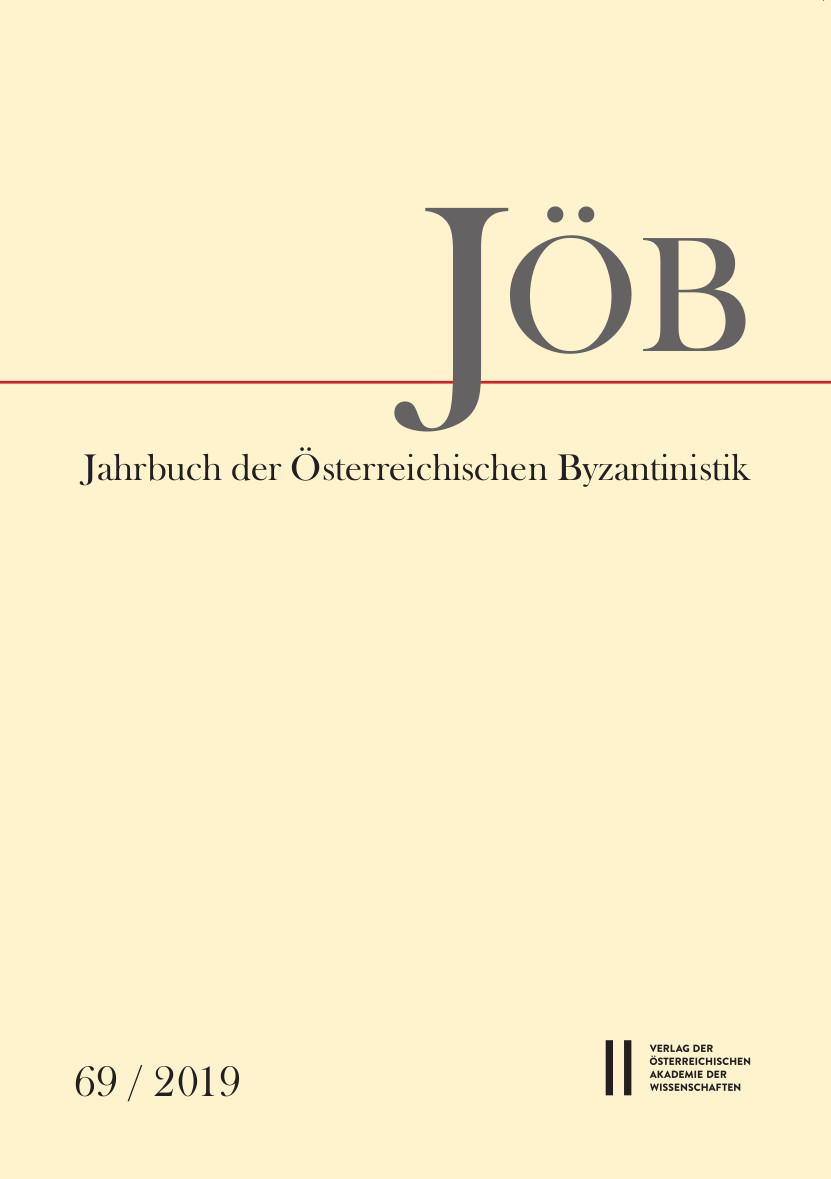Christophe ERISMANN
ist Professor an der Universität Wien in der Abteilung für Byzanzforschung und Modern Greek Studies
Christian GASTGEBER
ist Mitarbeiter in der Abteilung Byzanzforschung des Instituts für Mittelalterforschung der Österreichischen Akademie der Wissenschaften
Johannes PREISER-KAPELLER
ist Mitarbeiter in der Abteilung Byzanzforschung des Instituts für Mittelalterforschung der Österreichischen Akademie der Wissenschaften
Claudia RAPP
ist Professorin am Institut für Byzantinistik und Neogräzistik der Universität Wien und wirkliches Mitglied der Österreichischen Akademie der Wissenschaften
Elisabeth SCHIFFER
ist Mitarbeiterin in der Abteilung Byzanzforschung des Instituts für Mittelalterforschung der Österreichischen Akademie der Wissenschaften
|
 |
ISSN 0378-8660 Print Edition
ISSN 1810-536X Online Edition
ISBN 978-3-7001-8685-4 Print Edition
ISBN 978-3-7001-8732-5 Online Edition
Die Zeitschrift „Jahrbuch der Österreichischen Byzantinistik“ wurde 1951 als „Jahrbuch der Österreichischen Byzantinischen Gesellschaft“ gegründet und erhielt mit Band 18 (1969) ihren heutigen Namen. Trägerinstitutionen sind das Institut für Mittelalterforschung / Abteilung Byzanzforschung und das Institut für Byzantinistik und Neogräzistik der Universität Wien. Das seit 2019 neue Herausgebergremium wird in seiner Tätigkeit von einem wissenschaftlichen Beirat unterstützt, zusammengesetzt aus 15 international führenden Fachkolleg/inn/en. Beiträge werden auf Deutsch, Englisch, Französisch und Italienisch angenommen.
Artikel
Fabio Acerbi, Byzantine Rechenbücher: An Overview with an Edition of Anonymi J and L
Benedetta Contin, The Problem of Evil and the Theory of Contraries from Alexandria and
Athens to Armenia in Late Antiquity
Barbara Crostini, Another True Cross: Psellos, Heraklios, and the Cross of the Archangel
Michael at Sykeon
Beatrice Daskas, The Church of All-the-Saints (olim St Theophanô) at the Holy Apostles:
a Reappraisal of the Dossier of Sources
Tomasz Derda, Adam Łajtar, Organization of the Church in Medieval Nubia in the Light of
a Newly Discovered Wall Inscription in Dongola
Nikolas Hächler, Der Exarchat von Ravenna unter Kaiser Herakleios. Transformation und
Kontinuität staatlicher Herrschafts- und Verwaltungsstrukturen in den Peripherien des
byzantinischen Reiches in der ersten Hälfte des 7. Jahrhunderts
Constanze Höpken, Sattel und Hufeisen – Pferd, Muli oder Esel im Mar Salomon-Kloster in
Doliche
Dirk Krausmüller, Attitudes towards Fasting in Constantinopolitan Monasticism (Fifth to
Eleventh Centuries)
Dirk Krausmüller, The Encomium of the Apostle Philip by Michael the Monk (BHG 1530a).
Edition and English Translation
Marion Kruse, The Epitomator Ioannes Xiphilinos and the Eleventh-Century Xiphilinoi
Paolo Odorico, La sténographie de Michel Psellos
Peter Schreiner, Neues zu Leben und Werk des Isidor von Kiev. Kritische Bemerkungen zu
zwei Biographien
Juan Signes Codoñer, A Note on the Dossier of Geographical Glosses Used by the Compilers
of the So-called Version B of the Logothete Chronicle under the Macedonian Emperors
Staffan Wahlgren, Symeon the Logothete and Theophanes continuatus
Besprechungen
Eustathii Thessalonicensis exegesis in canonem iambicum pentecostalem, recensuerunt indicibusque instruxerunt
P. Cesaretti – S. Ronchey (Péter Bara)
Helga Gickler, Kaiser Michael IX. Palaiologos: sein Leben und Wirken (1278 bis 1320). Eine biographische Annäherung
(Martin Marko Vučetić)
Mediterranean Holocene Climate, Environment and Human Societies (Quaternary Science Reviews 136, Special Issue),
ed. A. Gogou – A. Izdebski – K. Holmgren (Johannes Preiser-Kapeller)
Kostas N. Konstantinides, Ἠπειρωτικὰ Μελετήματα. Ζητήματα ἀπὸ τὴν πνευματικὴ ζωὴ στὴ μεσαιωνικὴ Ἤπειρο /
Epirotan Studies. Aspects of Intellectual Life in Medieval Epiros (Andreas Rhoby)
Storytelling in Byzantium. Narratological approaches to Byzantine texts and images, ed. Ch. Messis – M. Mullett –
I. Nilsson (Carolina Cupane)
Alexios G. C. Savvides, The Beginnings and Foundation of Byzantine Studies. A Survey with a Bibliographical
Appendix (Andreas Rhoby)
Michele Trizio, Il neoplatonismo di Eustrazio di Nicea (George Karamanolis)
Corpus Fontium Historiae Byzantinae
|

